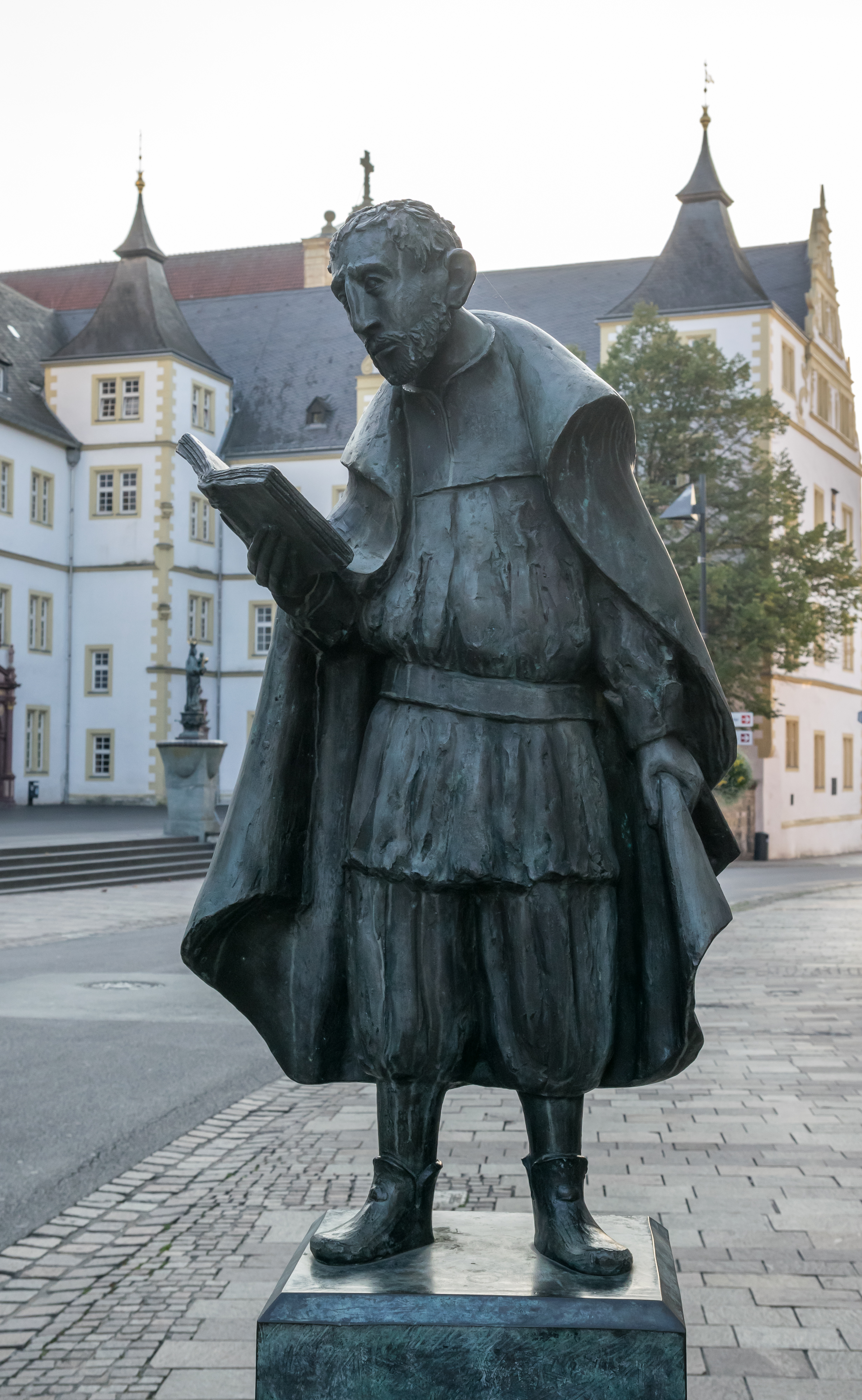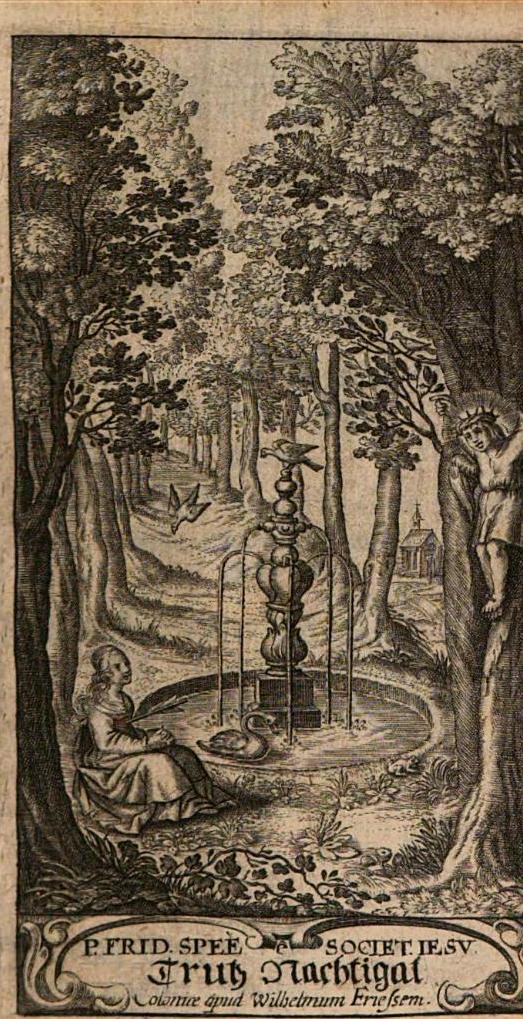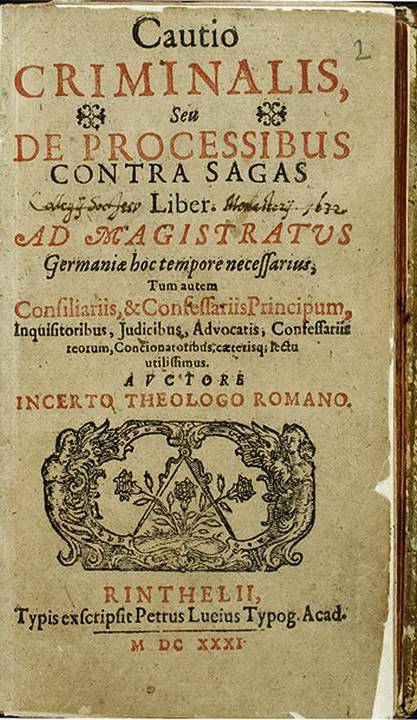Friedrich Spee on:
[Wikipedia]
[Google]
[Amazon]
 Friedrich Spee (also ''Friedrich Spee von Langenfeld''; February 25, 1591 ŌĆō August 7, 1635) was a German
Friedrich Spee (also ''Friedrich Spee von Langenfeld''; February 25, 1591 ŌĆō August 7, 1635) was a German
translator's introduction (pp. viiŌĆōxxxvi)
contains many details on Spee's life. He wrote, "Torture has the power to create witches where none exist."
 Spee was born at Kaiserswerth on the Rhine. On finishing his early education at Cologne, he entered the Society of Jesus in 1610, and pursued extensive studies and activity as a teacher at Trier,
Spee was born at Kaiserswerth on the Rhine. On finishing his early education at Cologne, he entered the Society of Jesus in 1610, and pursued extensive studies and activity as a teacher at Trier,
 Spee's literary activity was largely confined to the last years of his life, the details of which are relatively obscure. Two of his works were not published until after his death: ''Goldenes Tugendbuch'' (Golden Book of Virtues), a book of devotion highly prized by Leibniz, and ''Trutznachtigall'' (Rivaling the Nightingale), a collection of fifty to sixty sacred songs, which take a prominent place among religious lyrics of the 17th century and have been repeatedly printed and updated through the present.
Spee's literary activity was largely confined to the last years of his life, the details of which are relatively obscure. Two of his works were not published until after his death: ''Goldenes Tugendbuch'' (Golden Book of Virtues), a book of devotion highly prized by Leibniz, and ''Trutznachtigall'' (Rivaling the Nightingale), a collection of fifty to sixty sacred songs, which take a prominent place among religious lyrics of the 17th century and have been repeatedly printed and updated through the present.
 Spee pleaded for measures of reform, such as a new German imperial law on the subject, and liability to damages on the part of the judges. ''Cautio Criminalis'' contains 51 "doubts" 'dubiorum''which Spee discussed and carefully de-constructed. Amongst his more notable conclusions were:
* (Dubium 17) That the accused should be provided a
Spee pleaded for measures of reform, such as a new German imperial law on the subject, and liability to damages on the part of the judges. ''Cautio Criminalis'' contains 51 "doubts" 'dubiorum''which Spee discussed and carefully de-constructed. Amongst his more notable conclusions were:
* (Dubium 17) That the accused should be provided a
 Spee wrote the lyrics and tunes of dozens of hymns, and is still the most heavily attributed author in German Catholic hymnals today. Although an anonymous hymnist during his lifetime, today he is credited with several popular works including the Advent song " O Heiland, rei├¤ die Himmel auf", the Christmas carols "
Spee wrote the lyrics and tunes of dozens of hymns, and is still the most heavily attributed author in German Catholic hymnals today. Although an anonymous hymnist during his lifetime, today he is credited with several popular works including the Advent song " O Heiland, rei├¤ die Himmel auf", the Christmas carols "
Cautio Criminalis, 2nd Edition, 1632
ref>Note, per Marcus Hellyer, this edition may have been anonymously shepherded into print by Spee working with a printer in Cologne (not Frankfurt). For publication history both of the Rinteln 1631 edition and of the Frankfurt (= Cologne) 1632 edition, see Frank Sobiech: ''Jesuit Prison Ministry in the Witch Trials of the Holy Roman Empire. Friedrich Spee SJ and his Cautio Criminalis (1631)'', (Bibliotheca Instituti Historici Societatis Iesu, 80). Institutum Historicum Societatis Iesu, Rome 2019, pp. 106-164. * Frank Sobiech: ''Jesuit Prison Ministry in the Witch Trials of the Holy Roman Empire. Friedrich Spee SJ and his Cautio Criminalis (1631)'', (Bibliotheca Instituti Historici Societatis Iesu, 80). Institutum Historicum Societatis Iesu, Rome 2019, . {{DEFAULTSORT:Spee, Friedrich 1591 births 1635 deaths Critics of witch hunting Demonologists German Catholic poets 17th-century German Jesuits German male poets Poet priests 17th-century Jesuits Witchcraft in Germany
 Friedrich Spee (also ''Friedrich Spee von Langenfeld''; February 25, 1591 ŌĆō August 7, 1635) was a German
Friedrich Spee (also ''Friedrich Spee von Langenfeld''; February 25, 1591 ŌĆō August 7, 1635) was a German Jesuit
, image = Ihs-logo.svg
, image_size = 175px
, caption = ChristogramOfficial seal of the Jesuits
, abbreviation = SJ
, nickname = Jesuits
, formation =
, founders ...
priest, professor, and poet, most well known as a forceful opponent of witch trials and one who was an insider writing from the epicenter of the European witch-phobia. Spee argued strongly against the use of torture, and as an eyewitness he gathered a book full of details regarding its cruelty and unreliability.Friedrich Spee von Langenfeld: ''Cautio Criminalis, or a Book on Witch Trials'' (1631), translated by Marcus Hellyer. University of Virginia Press, 2003. . Thtranslator's introduction (pp. viiŌĆōxxxvi)
contains many details on Spee's life. He wrote, "Torture has the power to create witches where none exist."
Life
 Spee was born at Kaiserswerth on the Rhine. On finishing his early education at Cologne, he entered the Society of Jesus in 1610, and pursued extensive studies and activity as a teacher at Trier,
Spee was born at Kaiserswerth on the Rhine. On finishing his early education at Cologne, he entered the Society of Jesus in 1610, and pursued extensive studies and activity as a teacher at Trier, Fulda
Fulda () (historically in English called Fuld) is a town in Hesse, Germany; it is located on the river Fulda and is the administrative seat of the Fulda district (''Kreis''). In 1990, the town hosted the 30th Hessentag state festival.
History ...
, W├╝rzburg, Speyer, Worms and Mainz, where he was ordained a Catholic priest in 1622. He became professor at the University of Paderborn in 1624. From 1626 he taught at Speyer, Wesel, Trier and Cologne, and preached at Paderborn, Cologne and Hildesheim.
An attempt to assassinate Spee was made at Peine in 1629. He resumed his activity as professor and priest at Paderborn and later at Cologne, and in 1633 removed to Trier. During the storming of the city by the imperial forces in March 1635 (in the Thirty Years' War), he distinguished himself in the care of the suffering, and died soon afterwards of a plague infection contracted while ministering to wounded soldiers in a hospital.
His name is often incorrectly cited as "Friedrich von Spee".''Friedrich Spee zum 400 Geburtstag. Kolloquium der Friedrich-Spee-Gesellschaft Trier'' (in German). Paderborn: Gunther Franz, 2001.
Publications
 Spee's literary activity was largely confined to the last years of his life, the details of which are relatively obscure. Two of his works were not published until after his death: ''Goldenes Tugendbuch'' (Golden Book of Virtues), a book of devotion highly prized by Leibniz, and ''Trutznachtigall'' (Rivaling the Nightingale), a collection of fifty to sixty sacred songs, which take a prominent place among religious lyrics of the 17th century and have been repeatedly printed and updated through the present.
Spee's literary activity was largely confined to the last years of his life, the details of which are relatively obscure. Two of his works were not published until after his death: ''Goldenes Tugendbuch'' (Golden Book of Virtues), a book of devotion highly prized by Leibniz, and ''Trutznachtigall'' (Rivaling the Nightingale), a collection of fifty to sixty sacred songs, which take a prominent place among religious lyrics of the 17th century and have been repeatedly printed and updated through the present.
Cautio Criminalis
His principal work ''Cautio Criminalis'' is a passionate plea on behalf of those accused of witchcraft. The book was first printed anonymously in 1631 at Rinteln and attributed to an "unknown Roman theologian 'Incerto Theologo Romano''" It is based on his own experiences in the time and place (along the Rhine) that experienced some of the most intense and fatal witch-hunts, notably the W├╝rzburg witch trials, during which Spee was present. Spee was present as a Jesuit confessor during sessions of torture and executions."If the reader will allow me to say something here, I confess that I myself have accompanied several women to their deaths in various places over the years and I am now so certain of their innocence that I feel there's no effort that would not be worth my undertaking to try to reveal this truth."Spee wrote in direct opposition to many of the most well-known witch-mongers of his time and, like those works and most others in the demonological lineage going back to the 15th century, Spee also wrote in Latin.
"I pronounce from my soul that for a long time I have not known what trust I can place in those authors, Remy, Binsfeld, Delrio, and others... since virtually every one of their teachings concerning witches is based on no other foundations than fables or confessions extracted through torture."
 Spee pleaded for measures of reform, such as a new German imperial law on the subject, and liability to damages on the part of the judges. ''Cautio Criminalis'' contains 51 "doubts" 'dubiorum''which Spee discussed and carefully de-constructed. Amongst his more notable conclusions were:
* (Dubium 17) That the accused should be provided a
Spee pleaded for measures of reform, such as a new German imperial law on the subject, and liability to damages on the part of the judges. ''Cautio Criminalis'' contains 51 "doubts" 'dubiorum''which Spee discussed and carefully de-constructed. Amongst his more notable conclusions were:
* (Dubium 17) That the accused should be provided a lawyer
A lawyer is a person who practices law. The role of a lawyer varies greatly across different legal jurisdictions. A lawyer can be classified as an advocate, attorney, barrister, canon lawyer, civil law notary, counsel, counselor, solic ...
and a legal defense, the enormity of the crime making this all the more important.
* (Dubium 20) That most prisoners will confess to anything under torture in order to stop the pain.
* (Dubium 25) Condemning the accused for ''not'' confessing under torture (i.e. having employed the so-called "sorcery of silence") is absurd.
* (Dubium 27) That torture does not produce truth, since those who wish to stop their own suffering can stop it with lies.
* (Dubium 31) Documents the barbarous cruelty, and sexual assaults on women, brought on by the practice of strip- searching and fully shaving 'tonderi''every part of prisoner's body prior to the first session of torture.
* (Dubium 44) That accusations against alleged accomplices stemming from torture were of little value: either the tortured person was innocent, in which case she had no accomplices, or she was really in league with the Devil, in which case her denunciations could not be trusted either.
Spee was particularly concerned about cases where a person was tortured and forced to denounce (accuse) accomplices, who were then tortured and forced to denounce more accomplices, until everyone was under suspicion:
:"Many people who incite the Inquisition so vehemently against sorcerers in their towns and villages are not at all aware and do not notice or foresee that once they have begun to clamor for torture, every person tortured must denounce several more. The trials will continue, so eventually the denunciations will inevitably reach them and their families, since, as I warned above, no end will be found until everyone has been burned." (Dubium 15)
Legacy
''Cautio Criminalis'' helped bring an end to witch-hunting. The moral impact created by the publication was considerable. Already within the 17th century, a number of new editions and translations had appeared. Among the members of Spee's Jesuit order, his treatise found a favorable reception. Philipp van Limborch was a Dutch Protestant but his influential ''History of the Inquisition'' (1692) refers favorably to the work of the Jesuit Spee. Limborch was close with the EnglishmanJohn Locke
John Locke (; 29 August 1632 ŌĆō 28 October 1704) was an English philosopher and physician, widely regarded as one of the most influential of Age of Enlightenment, Enlightenment thinkers and commonly known as the "father of liberalism ...
as the two pushed for religious toleration.
Hymns
Vom Himmel hoch, o Engel, kommt
"Vom Himmel hoch, o Engel, kommt" ("From Heaven on High The Angels Sing", literally: From Heaven on high, O angels, come), also known as "Susani", is a German Christmas carol. It was first printed in 1622 as an alternate text to an older melody. I ...
" and "", and the Easter hymn "Lasst uns erfreuen
"" (Let us rejoice most heartily) is a hymn tune that originated from Germany in 1623, and which found widespread popularity after ''The English Hymnal'' published a 1906 version in strong triple meter with new lyrics. The triumphant melody and r ...
" widely used with the 20th-century English texts " Ye Watchers and Ye Holy Ones" and " All Creatures of Our God and King".
See also
Other prominent contemporary critics of witch hunts: *Gianfrancesco Ponzinibio (fl. 1520) *Johannes Wier
Johann Weyer or Johannes Wier ( la, Ioannes Wierus or '; 1515 – 24 February 1588) was a Dutch physician, occultist and demonologist, disciple and follower of Heinrich Cornelius Agrippa.
He was among the first to publish against t ...
(1515ŌĆō1588)
* Reginald Scot (1538ŌĆō1599)
*Cornelius Loos Cornelius Loos (1546 ŌĆō February 3, 1595), also known as Cornelius Losaeus Callidius, was a Roman Catholic priest, theologian, and professor of theology. He was the first Catholic official to write publicly against the witch trials raging throughou ...
(1546ŌĆō1595)
*Anton Praetorius
Anton Praetorius (1560 – 6 December 1613) was a German Calvinist pastor who spoke out against the persecution of witches (witchhunts, witchcraft trials) and against torture.
Life and writings
Praetorius was born in Lippstadt as the son o ...
(1560ŌĆō1613)
* Alonso Salazar y Frias (1564ŌĆō1636)
* Balthasar Bekker (1634ŌĆō1698)
*Robert Calef
Robert Calef (baptized 2 November 1648 ŌĆō 13 April 1719) was a cloth merchant in colonial Boston. He was the author o''More Wonders of the Invisible World'' a book composed throughout the mid-1690s denouncing the recent Salem witch trials of 1692 ...
(1648ŌĆō1719)
*Francis Hutchinson
Francis Hutchinson (2 January 1660 ŌĆō 1739) was a British minister in Bury St Edmunds when he wrote a famous book debunking witchcraft prosecutions and subsequently was made Bishop of Down and Connor in Ireland.
Education
Hutchinson was born i ...
(1660ŌĆō1739)
* Christian Thomasius (1655-1728)
* ├ürni Magn├║sson (1633ŌĆō1730)
References
Further reading
Cautio Criminalis, 2nd Edition, 1632
ref>Note, per Marcus Hellyer, this edition may have been anonymously shepherded into print by Spee working with a printer in Cologne (not Frankfurt). For publication history both of the Rinteln 1631 edition and of the Frankfurt (= Cologne) 1632 edition, see Frank Sobiech: ''Jesuit Prison Ministry in the Witch Trials of the Holy Roman Empire. Friedrich Spee SJ and his Cautio Criminalis (1631)'', (Bibliotheca Instituti Historici Societatis Iesu, 80). Institutum Historicum Societatis Iesu, Rome 2019, pp. 106-164. * Frank Sobiech: ''Jesuit Prison Ministry in the Witch Trials of the Holy Roman Empire. Friedrich Spee SJ and his Cautio Criminalis (1631)'', (Bibliotheca Instituti Historici Societatis Iesu, 80). Institutum Historicum Societatis Iesu, Rome 2019, . {{DEFAULTSORT:Spee, Friedrich 1591 births 1635 deaths Critics of witch hunting Demonologists German Catholic poets 17th-century German Jesuits German male poets Poet priests 17th-century Jesuits Witchcraft in Germany